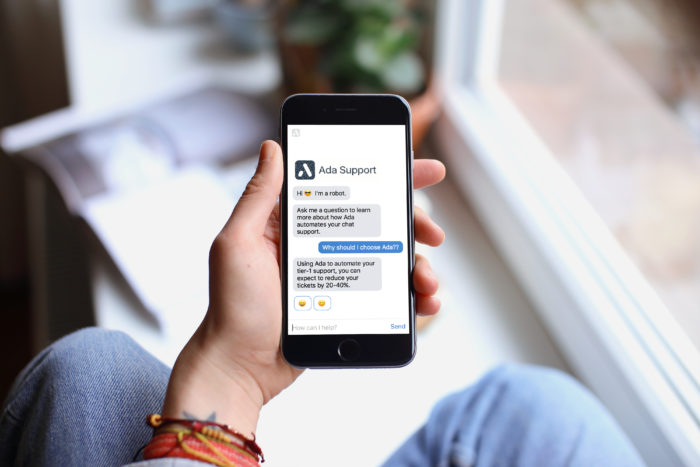Since its launch a few weeks ago, OpenAI’s ChatGPT has captured the imagination of users,…
Portfolio
As Ada Support launches its automated chat platform from stealth and announces an impressive $2.5 million seed round, we’re looking back at our journey with founders Mike Murchison and David Hariri. The story underscores the importance of perseverance and having the right founding team. Just after closing Fund II in October 2014, Boris took a […]
Since its launch a few weeks ago, OpenAI’s ChatGPT has captured the imagination of users,…
In an increasingly globalized world the economic success of a city, a region or a…
As Ada Support launches its automated chat platform from stealth and announces an impressive $2.5 million seed round, we’re looking back at our journey with founders Mike Murchison and David Hariri. The story underscores the importance of perseverance and having the right founding team.
Just after closing Fund II in October 2014, Boris took a trip to Toronto. As he planned his schedule, he logged into Mattermark to find new companies in the region. He stumbled across “Volley,” a startup we had never heard of before, but appeared at the top of the search results (for the query “Toronto”, “no known funding”) and had a high momentum score.
Intrigued, Boris reached out to Mike Murchison and learned that he and his co-founder David Hariri were building a social network to help others solves problems online.
About a week later, I made a trip to my hometown to meet Mike and was immediately blown away by his thoughtfulness. As I wrote back then:
“What’s exciting about Volley is that they are capturing the essence of Silicon Valley’s ‘pay it forward’ culture and replicating it on a grand scale. Living and working in the SF Bay Area, I have been fortunate enough to be surrounded by people who are incredibly generous with their time and knowledge…Volley offers the chance to open this Silicon Valley dynamic to community after community after community.”
We led the Volley pre-Seed round. While the team’s thoughtfulness translated into incredible traction among young professionals in the Toronto startup ecosystem and organic growth in other cities, we weren’t able to realize their original vision. And so, Mike and David had the very difficult, real-world task of letting their incredible team go, winding down Volley, and heading back to the drawing board. This was the beginning of 2016.
Our belief in Mike and David never wavered and we encouraged them to solve a pain point they had experienced while building Volley. The immediate thing that came to mind was customer support, and so they began to tackle the problem.
By the summer of 2016, Volley was now Ada. With Mike and David ferociously developing product and doing sales, they launched the Ada bot with early customers like Medium, Kik and Wattpad. You may have noticed that we launched a bot ourselves – now you know where it came from.

With great new traction and product market fit, the Ada team came out to SF to raise their Seed round in October 2016. Needless to say, Boris and I were super excited when Mike and David received a term sheet from Bessemer. Though admittedly, we were also a bit surprised given that BVP is traditionally a Series A investor…how did this connection happen between an SF-based VC and a Toronto-based startup?
A month later, after the round closed and we had our first Ada board meeting, we learned the backstory. Ben Mathews, a senior associate at BVP, had discovered Volley when he was at Google a few years back. Being a huge fan, he kept track of Mike and David as he transitioned into VC, and the rest is history 🙂
We love this story. While we can’t take credit for the turn of events and the progress the team has made, we’d like to think that we did invest in the right team. Mike, David, and Ada Support are yet another example of why founding teams matter most.
So, what exactly is Ada Support doing? They’ve developed a chat platform that uses proprietary AI technology to provide automated responses to inbound customer support requests. Today, Ada answers 40 customer questions each minute for companies like Shopify, Coinbase, Telus, and Medium, and volume continues to grow at 30 percent, month over month.
The platform makes powerful artificial intelligence accessible to non-technical support teams. Support reps can create and edit automated answers without any code. And the platform can be up and running in under and hour.
Ada Support isn’t about automating or replacing customer support altogether, but rather automating the repetitive, basic questions that come in every day so human reps can spend their time on more complex questions and building deeper relationships with high-value customers. Ada reduces the time spent on repetitive questions by 70 percent. That’s a win for everyone.
Some might wonder if it’s possible to pivot from a social network to a SaaS company. From what I’ve seen of Mike and David’s journey so far, I believe that this is the right fit for them. After all, Ada still carries the DNA for helping people in the way that Volley did – except now, they have a platform to do it at scale.
Crypto / Blockchain, Portfolio, Version One
We’re excited to announce our investment in Loon, a Canadian company building the country’s first regulated digital dollar. Version One led Loon’s $3M pre-seed round, alongside Garage Capital and a group of strategic Canadian angel investors. Loon is on a mission to create trusted, transparent payment infrastructure for Canada’s digital economy — starting with CADC, […]
As 2015 comes to an end, it’s time to reflect on what we’ve done and…
As the Internet evolves, the venture capital business starts evolving and we have been seeing…